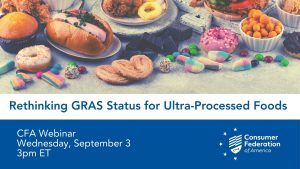View Webinar
When Congress gave the U.S. Food and Drug Administration (FDA) responsibility for evaluating food ingredients’ safety in 1958, the law provided an exemption from FDA review for substances like vinegar and spices that were “Generally Recognized as Safe.” In the years since, the food industry has increasingly taken responsibility for determining when food ingredients are “GRAS,” with little post-market oversight by FDA. Under current rules, companies need not even notify the agency when they make a new GRAS determination.
The GRAS processed has attracted widespread criticism for lacking transparency and failing to provide adequate safeguards for public health. As mounting evidence ties ultra-processed foods to diet-related disease, pressure on FDA to reform the GRAS process has grown. FDA can require industry to prove the safety of GRAS ingredient uses or cease those uses, as it did in 2015 when the agency banned the addition of trans fats to food. What’s stopping FDA from taking similar action now to revoke the GRAS status of refined processed carbohydrates that characterize many ultra-processed foods?
In this webinar, former FDA Commissioner David Kessler and former FDA Deputy Commissioner for Foods Michael Taylor discuss their experience with the GRAS process and their perspective on how FDA’s food additive law can be used to safeguard our foods. They focus on Commissioner Kessler’s recent citizen petition to FDA requesting the agency to revoke the GRAS status of various processed refined carbohydrates used in ultra-processed foods.
During the webinar, Commissioner Kessler discusses his citizen petition to revoke the GRAS status for various processed refined carbohydrates and remove them from commerce unless their use in food is authorized by a food additive petition. You can read the petition in full, and submit comments on it to FDA, by clicking on the link below:
https://www.regulations.gov/docket/FDA-2025-P-3071/document
Thomas Gremillion, CFA’s Director of Food Policy, moderates the discussion.


